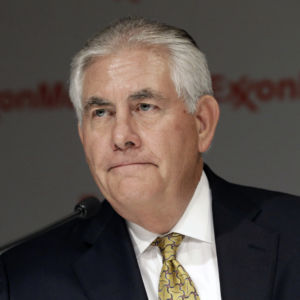Coverage of the confirmation hearing for Rex Tillerson as secretary of state was another example demonstrating that the media has lost its ability to step back from the climate orthodoxy narrative and seriously examine the actual content of someone’s views.
Some coverage characterized Tillerson’s answers about climate change as being in the denialist camp because he did not embrace the “scientific consensus,” others talked about hedging and being evasive. The coverage revealed more about the biases and the thought process of the writers than it did about the substance of Tillerson’s responses to politically motivated questions from senators who use hearings more for self promotion and gotcha moments than for illumination.
In response to questions, Tillerson said, “The risk of climate change does exist, and the consequences could be serious enough that action should be taken.” He also said that his views were formed over about 20 years as an engineer and a scientist, understanding the evolution of the science. He clearly stated that increasing greenhouse-gas concentrations in the atmosphere are having an effect on the Earth’s climate. “But, our ability to predict that effect is very limited.”
There is no disagreement that climate change is real and constitutes a risk, independent of its causes. There is no disagreement that our understanding has and is evolving. And, there is no disagreement that greenhouse gases, mainly carbon dioxide, have an effect on the climate system. The negative reaction to his comments seem to be based on the fact that his career was in the petroleum industry.
Almost all that alarmists assert is based on complex computer models and expressions of “professional judgment.” The computer models have been shown over and over to not mirror the actual behavior of the climate system and the professional judgment of so-called experts should be taken with a grain of salt and viewed within the context of their own self interest.
Advocates attempt to bolster their judgments by alluding to a 97 percent scientific consensus. Although that alleged consensus has been shown to be totally false, the media continue to cite it as a basis for supporting the “consensus.” The media and advocacy groups also continue to allege that the evidence linking extreme climate events such as the California drought and extreme weather events are clearly linked to global warming. Reviews of droughts in California going back to 1900 do not reveal a pattern of increasing frequency or duration.
The most recent Intergovernmental Panel on Climate Change Summary for Policy Makers states, “low confidence” regarding “increases in intensity and/or duration of drought” and “increases in intense tropical cyclone activity.” And this was in the context the IPCC weakening of the case that it had been building since its first report.
Since the case for apocalyptic climate change has gotten weaker and not stronger, why does most of the media still embrace it? One explanation is that its liberal biases align with environmental advocacy. But, that would be an oversimplified generalization. The explanation is more complex.
Journalists like other professions, including so-called climate experts, are subject to GroupThink, especially the sanctioning of those who do not conform to group norms and consensus. But, there is also a more complex set of factors that come into play.
Recently, Michael Lewis published “The Undoing Project,” which documents the work of Nobel Laureate Daniel Kahnamen and Amos Tversky on the psychology of decision making. Their work demonstrated the ways in which the human mind makes mistakes when judgments involving uncertain circumstances are involved. They make the point that we are not as rational as we would like to believe.

